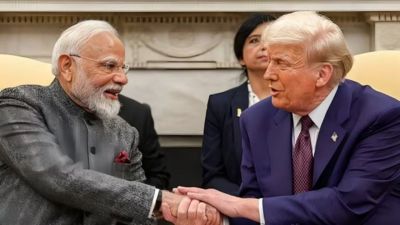Stay updated with the latest - Click here to follow us on Instagram
Marathi play, highlighting how Shivaji’s image is ‘exploited for political gains’, completes 700 shows
While part of the attraction for the audience is the presence of acclaimed Marathi filmmaker Nagraj Manjule, who is attending the celebratory show, the play itself is the main draw.
It is early Monday evening and the queue at the box office of Yashwantrao Chavan Natyamandir in Matunga is snaking right up to the entrance. People, dressed in their finest, scramble for tickets to the Marathi play Shivaji Underground in Bhimnagar Mohalla, which completes 700 shows today.
While part of the attraction for the audience is the presence of acclaimed Marathi filmmaker Nagraj Manjule, who is attending the celebratory show, the play itself is the main draw. It revolves around the most important and popular figure in Maharashtra’s history, the warrior king Shivaji Maharaj. But more importantly, the play doesn’t pander to the vote bank politics that revolves around Shivaji. In fact, it does quite the opposite – it busts the myths around the popular ruler and highlights how his ideology has been misused for political gains.
Conceptualised by the famous lok shair (people’s poet) and political activist Sambhaji Bhagat, it begins with Indra asking Yama for Shivaji. But the shrewd king escapes, leaving with Yama his turban. In his quest to find the king, Yama looks to find the person whose head will be the right fit for the turban he has in his hands. The turban, thus, becomes a metaphor for the king’s ideas, which have since been misappropriated by political parties.
Written by Rajkumar Tangde and directed by Nandu Madhav, the play opened in May 2012 in Mumbai. A musical, with powadas composed by Bhagat, it is performed by a group of farmers from Jalna. Madhav explains that the play fascinated him because Shivaji’s ideas have been “hijacked” by various political parties to portray him in an image that suits them. “For instance the fact that three different Shivaji Jayantis are celebrated in Maharashtra, each to suit a different political party. The play points out this fact alongside busting myths, like the one that the king was anti-Muslim.,” says Madhav, who played Harishchandra in the famous Marathi film Harishchandrachi Factory. Set in a Dalit colony, the play also focusses on how the king empowered the shudras (untouchables) under his rule. The play has also been subjected to censorship in the past, which it has been able to tide over for a successful run over the last six years.
“The subject and their love for Shivaji has united the audience. It’s an important piece of work that is crucial today more than it was ever before,” adds Madhav.







